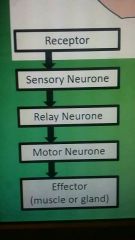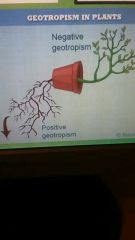![]()
![]()
![]()
Use LEFT and RIGHT arrow keys to navigate between flashcards;
Use UP and DOWN arrow keys to flip the card;
H to show hint;
A reads text to speech;
63 Cards in this Set
- Front
- Back
|
What is metabolism? |
The chemical reactions which happen inside your cells |
|
|
What is metabolic rate? |
How quickly these chemical reactions happens |
|
|
What happens to your metabollic rate if youre taller? |
It is higher |
|
|
Obese people have a higher.......than muscualr people? |
Metabolic rate |
|
|
What are carbohydrates for and an example of one? |
Energy Bread, rice, pasta |
|
|
What are fats for and an exapmle of one? |
Energy Butter, oils, meat |
|
|
What does protein do and an example of it? |
Growth and repair of tissues Meat eggs nuts |
|
|
What does fibre do and an example of it? |
Aids the digestive system Bread cereals fruit and veg |
|
|
What do vitamins and minerals do and examples of them? |
Needed in small amounts to help the body function Fruit and veg, dairy |
|
|
What is water for and what can it be found in? |
Keep the body hydrated Soups fruit |
|
|
Why do you need a balanced diet? |
So you are not malnourished |
|
|
What does anorexia cause? |
Irregular heart beat Fragile bones Irregular periods Infertile |
|
|
What does being obese cause? |
High cholesterol High blood pressure High risk of heart disease Higher risk of type 2 diabetes |
|
|
What is cholesterol |
A waxy substance from animal tissues |
|
|
What is a pathogen? |
An organism which can cause an infectious disease |
|
|
What is a microbe |
A microorganism Small enough to invade the body |
|
|
What is the difference between some types of bacteria |
Many are helpful Some are harmful and produce toxins |
|
|
Factors of a virus |
Non living Needs to use host cells to carry out some life processes All are pathogens |
|
|
What are the different ways our body protects us from infectious diseases? |
Lysozyme in tears Skin Mucus and cilia in airways Stomach Platelets in blood makes scabs |
|
|
What did semmelweiss encourage? |
Doctors to wash their hands in chlorine |
|
|
What do antibiotics do? |
Kills bacteria Does NOT cure viral infections |
|
|
What do painkillers do |
Prevent pain within the body Will NOT kill pathogens |
|
|
How do white blood cells destroy pathogens? |
Engulf Produce antibodies Produce antitoxins |
|
|
What is inside a vaccine |
A dead or inactive pathogen |
|
|
What do all senses contain? |
Receptor cells |
|
|
What is a reflex? |
An involuntary response |
|
|
What is a stimulus? |
A change in enviroment which our receptors can detect |
|
|
What order do these stages go in? Sensory neurone Relay neurone Effector Receptor Motor neurone |

|
|
|
What do hormones released by the kidney do? |
Regulate water content |
|
|
What does FSH mean? |
Follicle stimulating Hormone |
|
|
What does LH mean |
Luteinising Hormone |
|
|
What are the stages of the menstrual cycle? |
1) the pituitary gland releases FSH 2) the FSH causes the ovaries to produce Oestrogen 3) LH moves back down to the ovaries and triggers the release of an egg |
|
|
What does the contraceptive pill contain? |
Oestrogen Progesterone |
|
|
What is the name of the plant growth hormone? |
Auxin |
|
|
What is auxin broken down by? |
Sunlight |
|
|
What is Geotropism? |

How plants grow in respomse to gravity |
|
|
What is auxin used in to promote rapid growth to eventually kill of a plant? |
Weedkiller |
|
|
What are legal recreational drugs? |
Drugs taken for pleasure Allowed by the law |
|
|
What are illegal recreational drugs? |
Drugs taken for pleasure NOT allowed by the law |
|
|
What are medicinal drugs? |
Drugs taken to improve health |
|
|
What was thalidomide originally for? |
As a sleeping pill |
|
|
What was thalidomide later found to relieve? |
Morning sickness in pregnant women |
|
|
What were the severe side effects of thalidomide? |
Limb disfigurement |
|
|
What are the stages of drug testing? |
1) tested on human tissue 2) tested on animals 3) trial 1- human volunteers 4) trial 2- placebo effect |
|
|
How are animals adapted for dry conditions? |
Large surface area- lose more heat Efficent with water Thin layers of body fat Sand colour |
|
|
How are animals adapted for cold conditions? |
Small surface area- reduces heat loss Blubber- insulation Thick hairy coats White fur |
|
|
How are plants adapted for the desert |
Small surface area Spines instead of leaves Stores water in thick stems Large long roots |
|
|
How do animals protect themselves from predators? |
Thorns Shells Produce poisons Warning colours Eyes on the side of their head |
|
|
What do animals compete for |
Territory Food Water Mates |
|
|
What do plants compete for |
Light Space Water Minerals |
|
|
What are the living factors in the enviroment? |
Infectious disease Predators Prey Competitors |
|
|
What are the non living factors of the enviroment? |
Temperature Rainfall Air or water pollution |
|
|
What does the nucleus of a cell contain? |
DNA Chromosomes |
|
|
How many pairs does the cell nucleus contain? |
23 |
|
|
What do chromosomes carry? |
Genes |
|
|
What do genes control? |
Charateristics (hair colour, eye colour) |
|
|
What is an allele? |
A different version of the same gene |
|
|
What does sexual reproduction produce? |
Genetically different cells |
|
|
What is the name of the male sex cell? |
Sperm |
|
|
What does asexual reproduction produce? |
Genetically identical cells |
|
|
How are plants cloned? |
By taking cuttings of the plant to produce identical copies |
|
|
How do you make animal clones? |
Using embryo transplants |
|
|
How do you copy a use gene? |
Cut it from chromosomes using enzymes Insert into enzyme |

